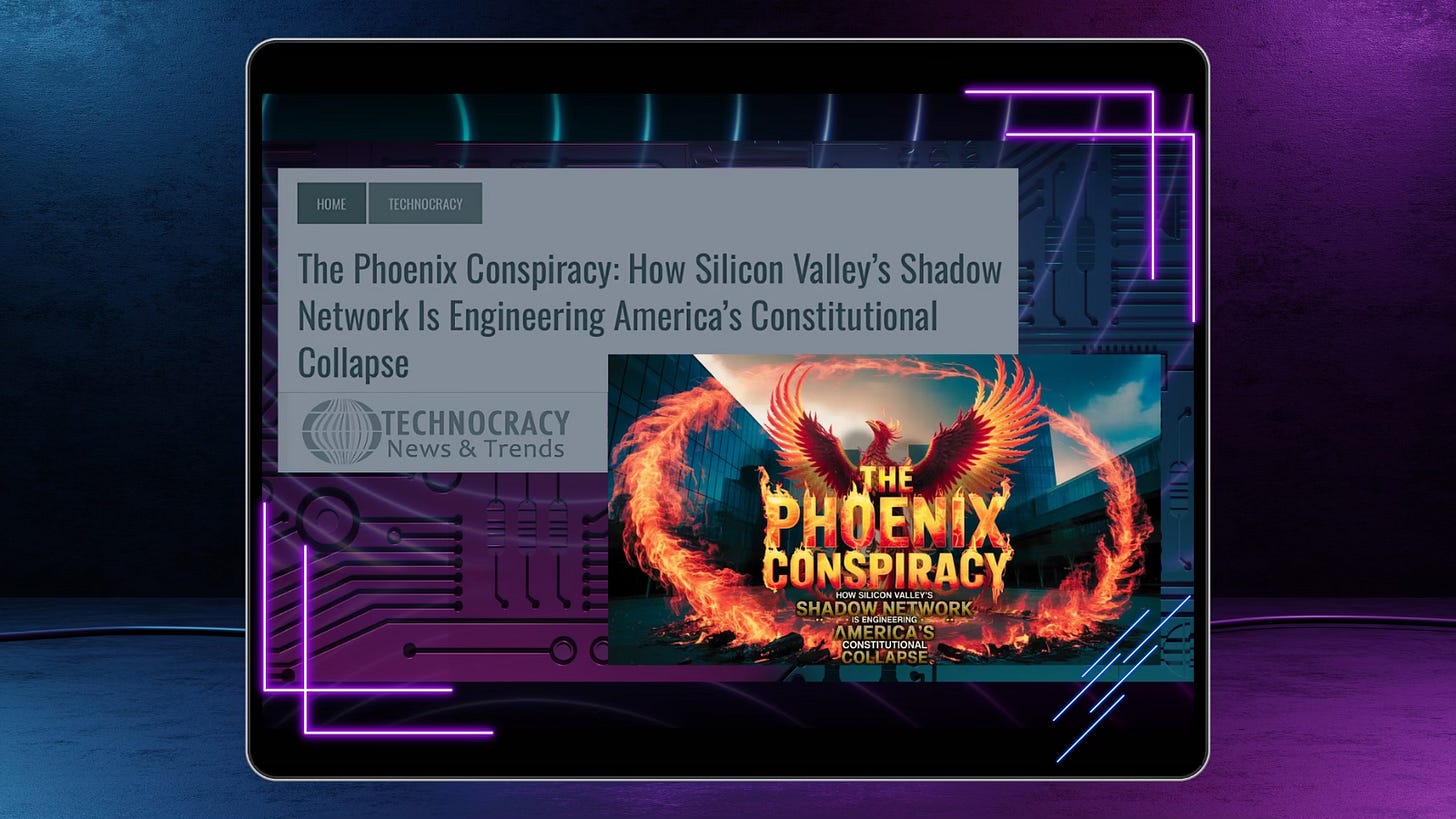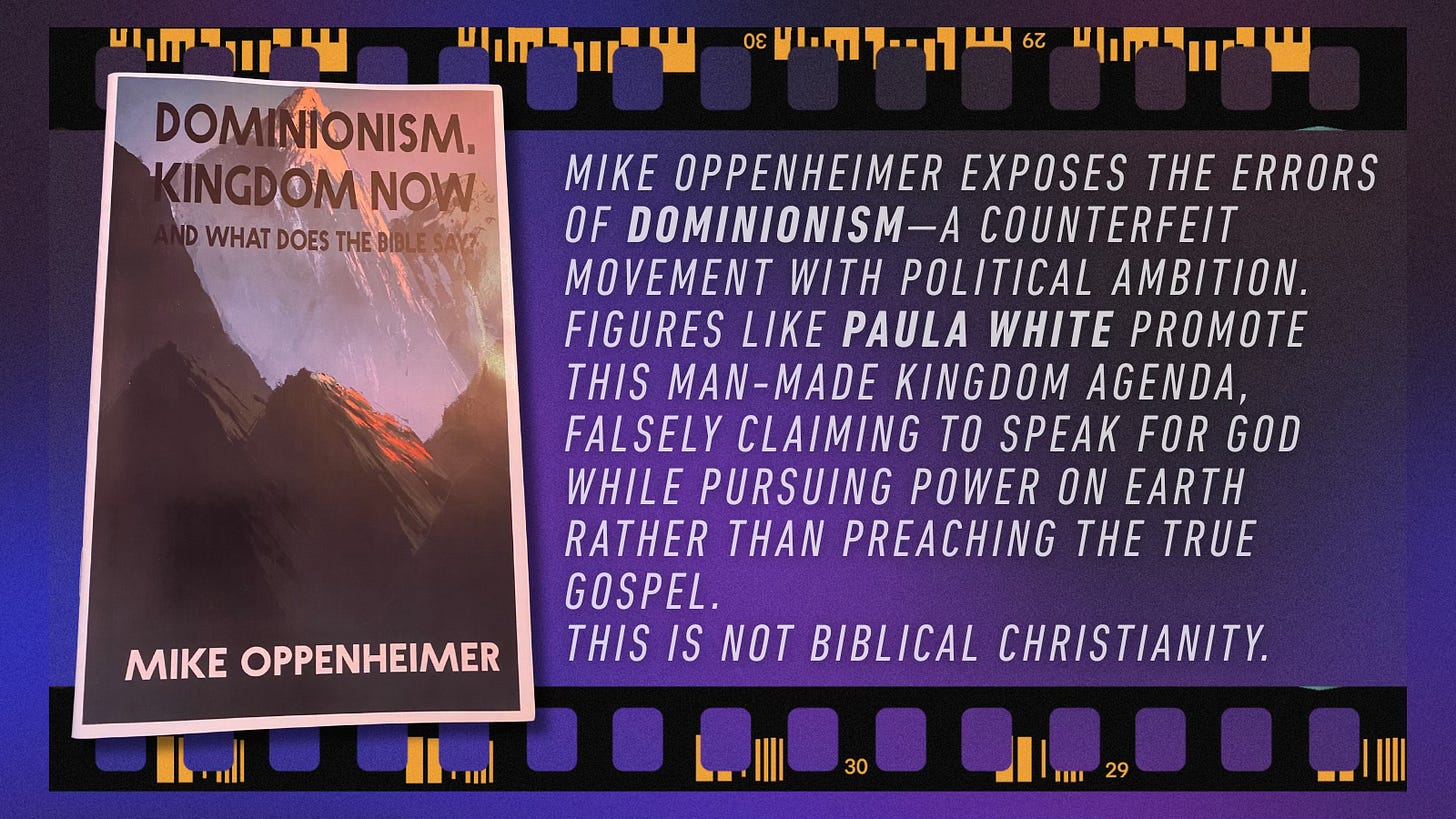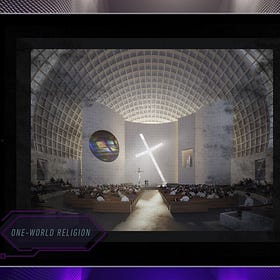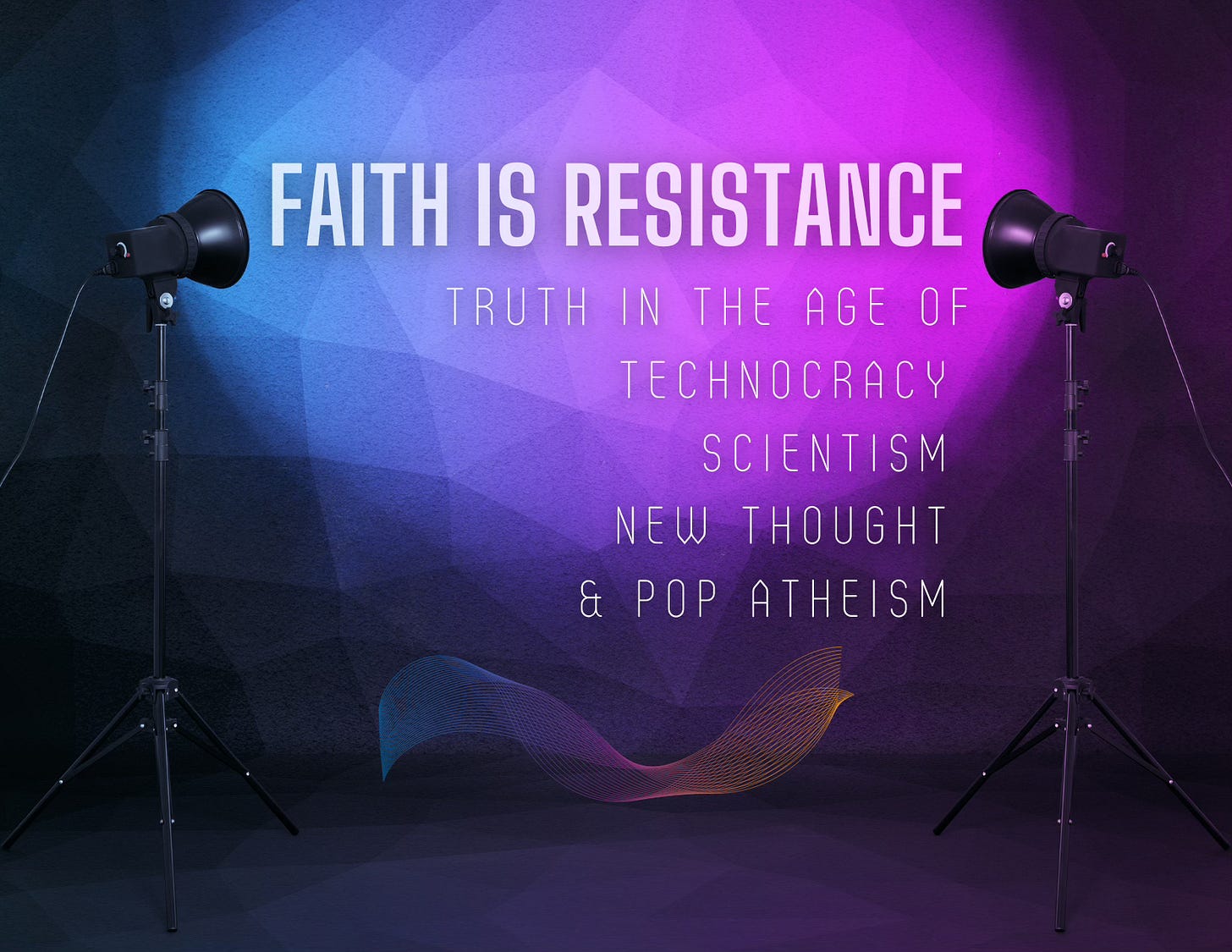The Dangerous Confusion Between Dominionism and Biblical Christianity
A helpful and clarifying response to Courtenay Turner and Patrick Wood
The warnings from Courtenay Turner and Patrick Wood about the convergence of techno-authoritarianism, post-democratic theory, and Christian nationalism are timely, well-researched, and essential. Their critique of the rising technocratic religion—the synthesis of digital governance, therapeutic collectivism, and pseudo-Christian identity politics—deserves a serious hearing.
This response is offered in good faith, not as a rebuttal but as a loving and clarifying addition to their important work. Their courage in exposing these global ideological systems is commendable, and we hope only to sharpen the clarity of the Christian theological distinctions necessary to withstand them.
However, in highlighting the dangers of this new global regime, they unintentionally lump true biblical Christianity and historic Calvinism into the very movement they are rightly trying to expose.
This conflation is not only misleading, it’s dangerous. It risks feeding the very totalitarian impulse it seeks to resist by turning Christianity itself into a scapegoat.
Patrick Wood, for instance, observes:
"When Technocracy was architected at Columbia University in 1932, the scientists and engineers made no provision for a political or spiritual component. In other words, they created a one-legged stool. Modern Technocrats have remedied this by adding a political component (Dark Enlightenment) and a religious ideology (loosely, Christian Nationalism). Thus, the three-legged stool is now engaged and walking us straight into techno-feudal digital slavery, aka Technocracy."
This is a powerful metaphor but the phrase "Christian Nationalism" requires careful scrutiny. When undefined or misapplied, it can implicate biblical Christianity itself as a threat to freedom and democracy. What Wood rightly identifies is the rise of a Dominionist counterfeit—not Christianity in its historic, scriptural form. Without clear theological distinctions, such sweeping language risks reinforcing the very narrative advanced by technocrats: that Christianity must be revised or removed to preserve peace.
Dominionism is a post-biblical theological error rooted in the Latter Rain movement of the 1940s and popularized by the New Apostolic Reformation (NAR), the Seven Mountains Mandate, and Charismatic Reconstructionism. It teaches that the church must take dominion over earthly institutions and establish the Kingdom of God on earth before Christ returns. Prominent figures such as C. Peter Wagner, Johnny Enlow, and Lance Wallnau promote this view, often blending spiritual warfare, apostolic governance, and cultural conquest into a quasi-theocratic mission.
This ideology is not derived from historic Protestant theology or Calvinism, but from esoteric and charismatic reinterpretations of end-times prophecy. In contrast, biblical Calvinism affirms the sovereignty of God, the authority of Scripture, and the spiritual mission of the church to proclaim the gospel, not rule civil government. Calvinism has historically defended liberty of conscience and opposed ecclesiastical tyranny—as seen in the Magdeburg Confession and Samuel Rutherford’s Lex, Rex.
The conflation of Dominionism1 with Reformed theology misrepresents both traditions and risks demonizing biblical Christianity itself. See Mike Oppenheimer, Dominionism: Kingdom Now and What Does the Bible Say?, Lighthouse Trails Publishing, 2019.
What Turner and Wood are describing is not the legacy of the Protestant Reformation or historic Christianity. It is a mutation: a spiritual heresy known as Dominionism. This theological error teaches that the church must take dominion over earthly governments, institutions, and culture in order to "usher in" the Kingdom of God before Christ returns. This ideology is deeply embedded in movements like the New Apostolic Reformation (NAR), the Seven Mountains Mandate, and various forms of postmillennial reconstructionism.
Dominionism crowns man as regent in Christ's place, building a kingdom of political power and cultural conquest. But this is not the Kingdom that Jesus proclaimed. Christ explicitly rejected political coercion as a means to spiritual ends (John 18:36). He never called His church to rule, but to preach, disciple, suffer, and await His return.
In contrast, biblical Christianity teaches that the world will grow darker, not brighter, before Christ returns. The mission of the church is not to conquer, but to proclaim the gospel, preserve sound doctrine, and prepare a people for the coming King. Revelation and Daniel do not paint a picture of saints reigning before Christ comes, but of saints being overcome until the Ancient of Days returns to establish His rule (Daniel 7:21-22, Revelation 13:7).
The Real Threat Is Dominionism—Not Biblical Christianity
One prominent example of Dominionism in public life is Paula White, who serves as spiritual advisor to President Donald Trump and leads the White House Faith Office. White has long promoted Kingdom Now theology and Word of Faith doctrines, both of which are tributaries of modern Dominionism. She has publicly declared that Christians are called to “rule and reign” on earth now—not merely in the age to come—and has regularly engaged in NAR-style "spiritual warfare" tactics, including prophetic decrees and angel-summoning language. Her alignment with prominent Dominionist figures like Cindy Jacobs, Dutch Sheets, and Lance Wallnau, along with her participation in Seven Mountains language and events, places her squarely within the Dominionist framework—not historic Christianity. Her theology promotes the idea of cultural conquest through spiritual force and political influence, which aligns more closely with charismatic authoritarianism than with the gospel of grace.
Pope Francis and the Great Convergence: WCC, Abrahamic House, and the False Unity Rising
In an era obsessed with "unity" at all costs, the World Council of Churches (WCC) has meticulously crafted a theological Trojan horse, championing interfaith initiatives that sound virtuous but conceal a devastating betrayal of biblical truth. As global institutions rally around the mythologized memory of medieval Cordoba and celebrate projects like Abu…
The World Council of Churches, headquartered in Geneva, serves as a religious arm of the global governance system, working in tandem with organizations like the UN, WHO, and WEF to advance a humanistic, ecumenical vision of planetary stewardship. This mirrors a parallel project emerging from Silicon Valley, where tech elites like Peter Thiel attempt to reengineer Christianity into a civilizational code—merging faith with governance, efficiency, and transhumanist aspirations. Though stylistically different, both the WCC and Thiel’s technocratic Christian allies promote a form of Dominionism: not the biblically grounded call to personal holiness and gospel proclamation, but a managerial conquest of culture and institutions in the name of Christian civilization. Whether cloaked in social justice or digital sovereignty, this counterfeit dominion prepares the world for a unifying religious system aligned with global governance goals.
We can tie the World Council of Churches (WCC) and the Geneva-based ecumenical apparatus to Dominionism—not in the American NAR/charismatic sense, but in the broader, technocratic-globalist sense of civilizational conquest under the guise of Christian unity, justice, and stewardship. This “Dominionism” is better understood as global theological managerialism—a syncretic, politically useful counterfeit that merges Church with global governance aims.
One can also connect this to the Silicon Valley–Peter Thiel brand of Dominionism, which is an elite-driven project to recast Christianity as a civilizational operating system—efficient, rational, and “Western”—to serve the technocratic architecture of the global elite. Though these two expressions (WCC and Thiel) seem ideologically opposite, they converge in outcome:
Both reconstruct Christianity into a tool for global order—either through interfaith humanitarianism (Geneva) or elite techno-theocracy (Thiel).
Both eclipse biblical Christianity by sidelining the gospel of repentance and salvation through Christ in favor of behavioral compliance (SDG-compatible ethics, psychological optimization, bio-digital fusion).
Both rely on Dominionist logic—that Christians (or Church-like institutions) must reclaim and administer the earth through systems of governance, not await Christ’s return in humility and suffering.
Calvinism Is Not Theocracy
There is a growing temptation to equate Calvinism with authoritarianism, especially as modern political actors adopt Calvinist language and postures. But this is a profound misunderstanding of what Calvinism historically is.
The Reformed tradition, properly understood, affirms the sovereignty of God over all things. It insists that salvation is by grace alone, through faith alone, in Christ alone. It has produced some of the most powerful theological defenses of liberty of conscience, resistance to tyranny, and institutional checks and balances. Think of the the Puritan resistance to divine-right monarchy. It was not rebellion for rebellion’s sake. It was a principled stand rooted in Scripture, affirming that:
All earthly power must submit to God’s higher law. When rulers become a terror to good, not evil, resistance is not just permitted, it’s required.
Slaying Leviathan
When rulers command what God forbids, or forbid what God commands, obedience to God comes first. Resistance then is not rebellion against rightful authority, it is faithfulness to higher authority when lesser rulers become tyrants.
Biblical Christianity Is the True Target
By confusing Calvinism with Dominionism, well-meaning critics risk scapegoating the one worldview truly capable of withstanding the rising technocratic order. Biblical Christianity is the real threat to the coming one-world faith precisely because it:
Proclaims Christ as the only King, with no rivals.
Affirms the depravity of man, resisting utopian schemes.
Upholds conscience and liberty, not compliance and coercion.
Anchors salvation in truth, not in therapeutic unity.
This is why the Beast system seeks to co-opt Christianity—not eliminate it outright, but rebrand it into a usable moral vocabulary. Dominionism becomes the perfect theological operating system for technocracy: a spiritual justification for compliance, conquest, and collectivism.
Meanwhile, those who hold fast to the gospel of grace, the authority of Scripture, and the return of Christ as King are increasingly marginalized, misrepresented, and falsely accused.
A Call to Discernment
Courtenay Turner and Patrick Wood have done the public a great service by exposing the ideological and financial architecture behind the emerging techno-feudal world order. But it is critical that this analysis does not become a blanket indictment of Christianity or its historic theological expressions. If we fail to distinguish between heresy and orthodoxy—between Dominionism and biblical faith—we will make ourselves vulnerable to the very deception we seek to resist.
True Christianity is not about ruling the world. It is about serving a risen King who has promised to return—not to find a triumphant church enthroned in power, but a faithful remnant awaiting His appearing.
"For the grace of God has appeared, bringing salvation for all people, training us to renounce ungodliness and worldly passions... waiting for our blessed hope, the appearing of the glory of our great God and Savior Jesus Christ." (Titus 2:11-13)
In the days ahead, may we be known not for building Babel, but for bearing witness to the coming King.
Soli Deo Gloria
Summer Black, Director, Armor of Truth
Phoenix, We Have A Problem
Summary: This article offers a detailed theological and ideological response to Courtenay Turner’s The Phoenix Conspiracy, a well-researched critique of technocratic authoritarianism that unfortunately collapses faithful Christianity into the very system it opposes. In light of Patrick Wood’s
Endnotes
Patrick Wood, editor’s note to Courtenay Turner, The Phoenix Conspiracy: How Silicon Valley's Shadow Network Is Engineering America's Constitutional Collapse, Technocracy News, July 2025, https://www.technocracy.news/the-phoenix-conspiracy-how-silicon-valleys-shadow-network-is-engineering-americas-constitutional-collapse/ (accessed July 12, 2025).
Mike Oppenheimer, Dominionism: Kingdom Now and What Does the Bible Say?, Lighthouse Trails Publishing, 2019.
Dominionism · Christian Nationalism · Technocracy · Biblical Christianity · Calvinism · Patrick Wood · Courtenay Turner · One World Religion · Seven Mountains Mandate · New Apostolic Reformation · TheoBros · Techno-Feudalism · Christian Theocracy · Gospel vs. Globalism · Reformed Theology · Political Eschatology · Postmillennialism · Digital Authoritarianism · Spiritual Deception · Technocratic Religion · World Council of Churches · WCC
About Armor of Truth: https://armoroftruth.substack.com/about
Download the Armor of Truth Mobile App Free
NEW! AoT Locals
NEW! AoT Telegram
Join our AoT Newsletter email list
Armor of Truth, Inc is a 501(c)(3) Non Profit Organization
Donations are tax deductible
By supporting Armor of Truth you are helping to reach thousands of people daily with the Gospel of Jesus Christ and encouragement to persevere in a world that is hostile to the gospel. Please consider making a donation to help support this mission.
Support Armor of Truth Donate
Silicon Valley ACTS 17 Collective—backed by Peter Thiel and branded as a bold revival of Christian cultural influence—is not a return to biblical faith but a sleek rebrand of Paula White-style Dominionism. This is not biblical Christianity, nor is it Calvinism. It recycles the same “Kingdom Now” heresy that confuses Christ’s future reign with man’s present-day conquest, but with a high-tech upgrade: a humanistic, SDG-approved on-ramp to global influence. While Paula White’s version relied on emotional theatrics and prosperity gospel flash, ACTS 17 wraps the same theology in intellectual prestige, political strategy, and entrepreneurial polish.
It hijacks the language of Reformed theology—cultural mandate, kingdom, sovereignty—while gutting it of its doctrinal core. True Calvinism exalts God’s sovereignty and awaits Christ’s return to establish His Kingdom in righteousness. This movement instead enthrones man as redeemer through technological stewardship, political dominance, and marketplace ministry. It trades repentance for relevance, the cross for control, and gospel truth for stakeholder compliance. This isn’t Reformation—it’s Reinvention. A syncretic technocratic gospel dressed in respectable robes and built to serve a new global order.


















I hate to say it but it actually does make sense to see Calvinism uniting with the more radical theology of Radical Christian Nationalism. And I have been witnessing it in the Southern Baptist Churches in my little town as well. In cross studies of the pillars of Islam and the pillars of Calvinism, I have found almost exact quotes from the Quran that parallel with Calvinism. As I looked deeper at this history, the infiltration of Islam was deep into its successful move into France during Calvin's lifetime. While the battle between Islam and France's Christianity is one that is epic, here are a few quick quotes that made me stand up and wonder what Calvinism has in store for the Christian Nationalist movement as their theology matches Christianity's polar opposite.
ISLAM:
"By predestination we mean the eternal decree of God, by which he determined with himself whatever he wished to happen with regard to every man. All are not created on equal terms, but some are preordained to eternal life, others to eternal damnation; and, accordingly, as each has been created for one or other of those ends, we say that he has been predestined to life or death (Institutes, 3.21.5)."
…some are preordained to eternal life, others to eternal damnation; and, accordingly, as each has been created for one or other of those ends, we say that he has been predestined to life or death (Institutes, 3.21.5).
[God] arranges all things by his sovereign counsel, in such a way that individuals are born, who are doomed from the womb to certain death…(Institutes, 3.23.6).
There are more - many more, but you get the picture. I have been told by little old ladies from Southern Baptist congregations that "we don't need to help because when wickedness arises Jesus will return."
That pretty much sums up the plan. Allow chaos to bring peace. The problem is that the lack of chaos results in control. And they will gift their lives to technocracy in exchange for peace.
What a mess.